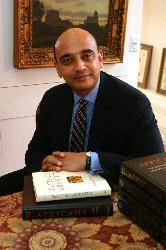To help mark the return of an honor code at Union, Kwame Anthony Appiah, one of the country's leading philosophers, will speak at 1 p.m. Thursday, Sept. 27, in the Nott Memorial.
His talk, "The Honor Code: How Moral Revolutions Happen," takes its title from his 2010 best-selling book. The talk is free and open to the public.
Named one of Foreign Policy’s Top 100 public intellectuals, Appiah is the Laurence S. Rockefeller University Professor of Philosophy at Princeton. He is also president of the PEN American Center, the world’s oldest human rights organization. In 2012, he was awarded the National Humanities Medal by the White House.
To learn more about Appiah, click here.
Union adopted an honor code in the early part of the 20th century, but students and faculty voted to drop it in 1925 after concerns that students weren't accurately reporting all instances of cheating. Subsequent efforts over the years to reinstitute an honor code failed for various reasons.
Beginning in 2006, the debate over an honor code at Union was revived and in 2011, groups representing faculty, students and administrators decided that an honor code would support the College’s mission and vision of developing students as engaged, innovative and ethical contributors to society.
"Professor Appiah, the philosopher of moral revolutions, visits Union as the college initiates a minor moral revolution of its own," said Robert Baker, the William D. Williams Professor of Philosophy and director of the Ethics Across the Curriculum Program. "An honor code based on a student pledge and an honor court in which students hold fellow students accountable for following their pledge that 'as part of a community that values intellectual effort, curiosity and discovery, they are obligated to act with full academic honesty.' "
To learn more, click here.
Appiah's talk is sponsored by the Ethics Across the Curriculum, the Dean of Studies Office and the Philosophy Department.
